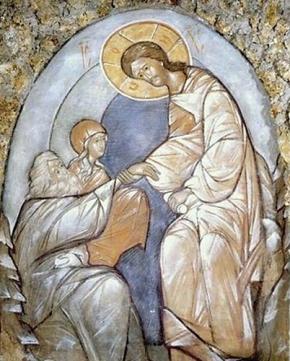
At the heart of the attitude evidenced in the comments of the Clinton campaign about Catholicism is a common enough attitude. The person making the comment, like the person to whom he or she is making them, is aligned with the spirit of the age and is the modern day Pharisee – thanking fate (he or she does not, of course, believe in God) that he (or she) is not like those backward looking folk hanging on to their guns and their religion. They have advanced far beyond such things and entered into the Nirvana of contemporary thought where the only bad thing is to be sure about anything except the backwardness of those who do not agree with the common wisdom of the age. That such ‘wisdom’ is untested and untried is no bar to those who hold these things on no more than the authority of the fact they wish to sound ‘cool’ and what used to be called ‘with it’. ‘Group think’ is a very powerful phenomenon, and not least among those who like to think of themselves as intellectuals.
And yet, and yet, there are very many men and women of intellect who believe in God, and who are humble enough to admit that the secrets of the universe are not wholly revealed to mankind – whatever its high opinion of itself. There was that brief moment of utter hubris in some circles after the fall of Communism when people were bold enough to say that history had ended. But the Gods of the Copybook headings had their revenge – as they tend to. As we survey the chaos that is the Middle East and watch its ripples spread to the corners of Europe, we might well wish history was ended. Instead, we see those instruments of post-1945 civilisation such as the UN and its various agencies, and NATO, all powerless to intervene to do anything to save the millions whose lives are being wrecked by the violence.
The nineteenth century was full of thinkers such as Macaulay who imagined that they had entered some new age marked by progress – he could barely imagine how people had managed to survive in Elizabethan manor houses or castles, and rejoiced in their destruction and replacement by ‘modern’ architecture – a view which has not survived in that sphere or, it might be added, in others. Mankind, as Kipling’s poem implies, remains much what it has always been – the the dog returns always to its vomit.
Nor should this surprise us, because it is precisely what our Christian faith tells us, that however hard man tries to do what he knows is right, he does not what he wills, but too often what he did not mean to do. The words of the old Anglican general confession ring true – ‘We have left undone those things which we ought to have done; And we have done those things which we ought not to have done; And there is no health in us’. Nor is there. Had there been then the Lord Jesus would not have needed to have become Incarnate, suffered and died and then rose again to save us. There is one name alone which saves us – and it is not that of any politician. The works of men are vain, empires rise and they fall, and for all save a few, their names pass away and are forgotten. True ‘progress’ is possible only in cooperation with the wisdom of God. But we have eaten of the fruit of the tree of good and evil, and have exiled ourselves from Eden.

Very good C.
You might have ended it with; “The only true ‘progress’ is the movement of mankind’s collective will toward the Will of God.” Though even that seems to oscillate from century to century and age to age.
LikeLiked by 1 person
Very true 🙂
LikeLike
Very insightful. I’m reminded of that Chesterton quote about progressivism “We cannot decide what is good, but let us give it to our children.”
LikeLiked by 1 person
In addition to the usual vows of poverty, chastity and obedience, Jesuits take a fourth vow of obedience to the pope regarding their mission.
http://abcnews.go.com/Health/wireStory/pope-marching-orders-jesuits-superior-43012626
That’s a lie bigger than all the lies told by the catholic cult. The murderous Jesuits take orders from the Black Pope.
Enjoy your dark satanic religion all you idolatrous cathols.
LikeLike
You are Jack Chick – admit it, he didn’t die, it’s a conspiracy
LikeLike
Why, that’s the nicest thing you ever said to me my brother. I pledge to live up to the great Jack Chick and his godly legacy, as long as there is breath in my lungs.
LikeLike